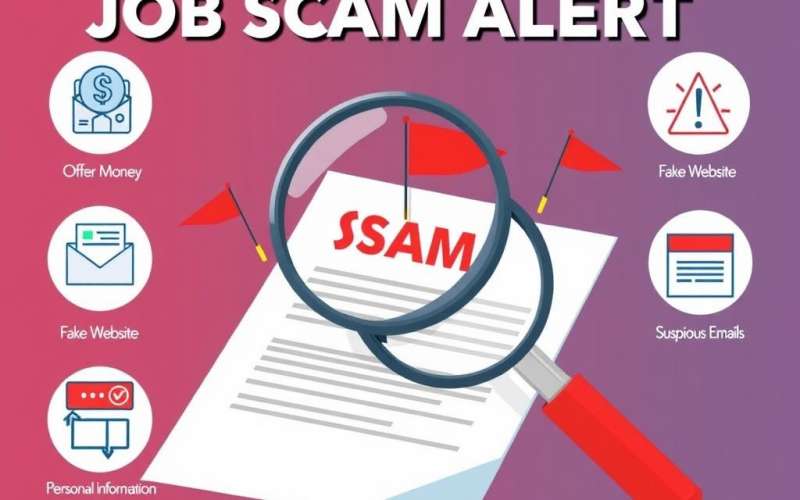Job Scam Alert:
Job Hunt Guidance
⦿Feb 06, 2025

How to Spot Fake Job Offers Before You Get Trapped
Every job seeker dreams of finding the perfect role—one that aligns with their skills and offers a great salary. But what happens when that dream turns into a nightmare? Job scams are on the rise, and scammers are becoming more sophisticated every day. Falling victim to one of these scams can cost you time, money, and even your personal information.
So, how can you tell if a job offer is real or a scam? Here’s a guide to identifying red flags and protecting yourself during your job search.
1. The Biggest Red Flag: Paying for a Job or Interview
This is the most common and dangerous scam. If a company asks you to pay for:
• A job application form
• An interview processing fee
• A training or registration fee
• Any upfront costs for materials or uniforms
It’s a scam.
Legitimate employers never ask candidates to pay for a job or interview. Remember: employers pay employees; it should never be the other way around. If you’re asked to pay, walk away immediately.
2. Suspicious Interview Locations
A legitimate company will conduct interviews in professional and verifiable locations. If you’re invited to an interview at:
• A location that doesn’t exist on Google Maps
• An obscure or remote area
• A hotel room instead of a conference or meeting space
You should proceed with caution. For example, if the interview is held in a hotel, check if it’s in a proper conference room, not a random suite or restaurant. A vague or suspicious location is a major red flag.
3. Fake Websites and Social Media Profiles
Scammers have become increasingly sophisticated, creating fake company websites and social media accounts to appear legitimate. But a website alone doesn’t make a company real.
Here’s how to verify:
• Check the company’s social media pages. Are they active, or are they dormant?
• Look for employee reviews on platforms like LinkedIn or Glassdoor.
• Search for the company name alongside the word “scam” to see if others have reported issues.
• Call the company’s official number listed online to confirm its legitimacy.
Don’t stop at the surface. Dig deeper to ensure the company is authentic.
4. Email Red Flags
Emails can often expose scammers. Be cautious if you receive:
• Emails from free services like Gmail or Yahoo instead of a professional domain (e.g., hr@companyname.com).
• Emails with poor grammar, spelling errors, or generic greetings like “Dear Applicant.”
• Unprofessional emails lacking proper formatting or signatures.
Always verify the sender’s email address. If it looks suspicious, it probably is.
5. Job Offers That Sound Too Good to Be True
If the job offer sounds too good to be true, it likely is. Examples include:
• A receptionist job offering $10,000 per month.
• A “work-from-home” role with no experience required but an unusually high salary.
• Any job offering immediate riches for minimal effort.
Scammers use these tactics to lure desperate job seekers. Always compare the job offer to industry standards and question anything that feels unrealistic.
6. Instant Job Offers Without an Interview
Legitimate companies have a hiring process. If you’re offered a job without an interview—or if the process feels rushed—it’s likely a scam.
Common phrases to watch out for:
• “You’re hired! No interview needed.”
• “Just send us your details, and we’ll finalize your employment.”
• “We trust you’re the right fit without needing to meet.”
Always insist on an interview. A legitimate employer will want to know more about you before hiring.
7. Requests for Personal Information Too Soon
Scammers often ask for sensitive information early in the process, such as:
• Bank account details
• National ID or passport information
• Social Security Number (SSN)
• Your home address
Legitimate employers will only request this information after you’ve been officially hired. If they ask for it upfront, it’s a major red flag.
How to Protect Yourself
Here are some general tips to stay safe:
1. Never pay for a job or interview.
2. Verify the company’s legitimacy by doing thorough research.
3. Trust your instincts—if something feels off, it probably is.
4. Report suspicious job postings or emails to authorities or job platforms.
Final Thoughts
Job scams are designed to prey on desperation and vulnerability, but you can outsmart them by staying alert and informed. If you ever feel uneasy about a job offer, take a step back and evaluate the situation. The right job is out there—you just need to approach your search with caution.
Have you ever encountered a job scam? Share your story in the comments below to help others avoid the same traps.
For more job search tips and career advice, subscribe to our blog. Stay safe, and happy job hunting!
Download the Vacancies App on the App Store and Google Play Store
- Share This Job

Write A Comment
No Comments